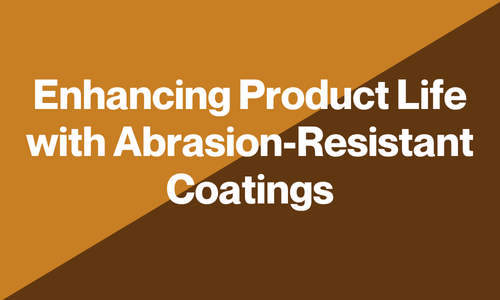In today’s demanding industrial and manufacturing environments, where equipment is constantly exposed to mechanical stress, friction, and extreme operating conditions, the need for durable, long-lasting materials is more critical than ever. In this article, we’ll delve into what abrasion-resistant coatings are and how they work, explore the different types such as ceramic, polyurethane, and epoxy coatings, and highlight their advantages like increased longevity, cost efficiency, and improved safety. We’ll also examine their key applications in industries like mining, construction, oil and gas, and manufacturing, as well as important considerations for selecting the right coating based on your operational needs. Whether you’re upgrading existing equipment or planning a new project, understanding these coatings can help enhance productivity and reduce long-term operational risks.
Abrasion-Resistant Coatings: Increasing Toughness & Efficiency
Abrasion resistant coatings are engineered to protect surfaces from mechanical degradation and erosion due to rubbing, scraping, or friction. By forming a strong protective barrier, these coatings minimize the wear and tear of materials exposed to high-traffic conditions, abrasive media, or constant movement. These coatings are an essential component in manufacturing, mining, and transportation in ensuring the integrity of machinery and infrastructure.
The Importance of Abrasion-Resistant Coatings
Without protection, materials and components exposed to continuous frictional contact degrade rapidly. This results in constant repairs, down time, and higher costs of operation. Abrasion-resistant coatings neutralize these problems by increasing surface hardness and elasticity of the surface materials they protect. As a result businesses benefit from longer service intervals, better performance and cost savings over time.
How Abrasion-Resistant Coatings Work
Abrasion-resistant coatings function by creating a hard, wear resistant coating on the surface of a material. The coating absorbs the stress and impact of mechanical contact preventing the material from wearing off. Most of these coatings have hard fillers or resins like epoxy, polyurethane or ceramic particles that provide toughness and wear resistance to the treated surface.
Types of Abrasion-Resistant Coatings
- Epoxy Coatings
Among the best forms of coatings are epoxy-based types. They provide good adhesion and chemical resistance, as well as durability. The most appropriate application of such coatings is within an industrial environment on machinery and on floors that require a strong protective surface to handle the wear and tear.
- Polyurethane Coatings
These coatings provide a flexible but highly abrasion-resistant surface. Polyurethane is usually applied where surfaces need to be impact resistant in handle vibration and movement without cracking.
- Ceramic Coatings
Known for their extreme hardness, ceramic coatings are typically used in high-temperature and high-friction environments such as in turbines or automotive components. They provide superior protection against both abrasion and heat.
- Hard Chrome Plating
This coating involves electroplating a layer of chromium onto a metal surface, offering excellent wear resistance and reduced friction. It is commonly used in hydraulic cylinders and piston rods.
- Thermal Spray Coatings
Thermal spray involves melting materials and spraying them onto a surface to create a hard, wear-resistant layer. This method is suitable for large-scale or irregularly shaped components and is used extensively in aerospace and marine industries.
Applications of Abrasion-Resistant Coatings
- Mining and Construction Equipment
Machinery used in mining and construction is exposed to rocks, debris and harsh elements. Abrasion-resistant coatings protect equipment parts like buckets, blades and conveyors from rapid wear and tear.
- Industrial Flooring
Heavy foot traffic, machinery movement and chemical spills can decrease industrial flooring. Applying abrasion-resistant coatings helps maintain surface integrity and extend floor life in warehouses, factories and garages.
- Oil and Gas Pipelines
Pipelines transport fluids that can have abrasive particles. Coatings avoid internal erosion, corrosion, and degradation to ensure the reliability and safety of the transport system.
- Automotive and Aerospace Components
Engine components, gears, and bearings are subjected to continuous friction. Abrasion-resistant coatings minimize wear, improve performance and add to extended service life in automotive and aerospace use.
- Marine and Offshore Structures
Structures that are subjected to saltwater and mechanical stress undergo corrosion and wear. Marine equipment and offshore platforms are shielded from the combined effects of abrasion, and corrosion by specialized coatings.
Benefits of Abrasion-Resistant Coatings
- Prolonged Equipment Life
These coatings significantly reduce surface degradation which means machinery and parts remain operational for longer periods without the need for frequent replacements.
- Lower Maintenance Expenses
Through wear reduction and damage reduction, abrasion-resistant coatings decrease repair and maintenance frequencies, reducing maintenance and repair budgets, and associated downtime.
- Enhanced Operating Efficiency
Abrasion-resistant coated surfaces operate smoother and more consistently, resulting in improved overall performance and reduced energy usage in moving components.
- Improved Safety
In situations where equipment failure might be dangerous, abrasion resistant coatings add to increased structural strength, and reliability.
- Environmental and Economic Benefits
More durable equipment minimizes the demand for raw material extraction and the production of spare parts which promotes sustainability and reduces operational cost.
Conclusion
Abrasion-Resistant Coatings are a crucial element in the performance and durability of today’s industrial systems. By creating a protective barrier from wear and tear they provide increased durability, reduce expenses, and increase safety in multiple applications. From protecting machinery within a factory or infrastructure in the marine environment, investing in abrasion resistant coatings is a wise investment in maintaining maximum performance and increasing product lifespan.

